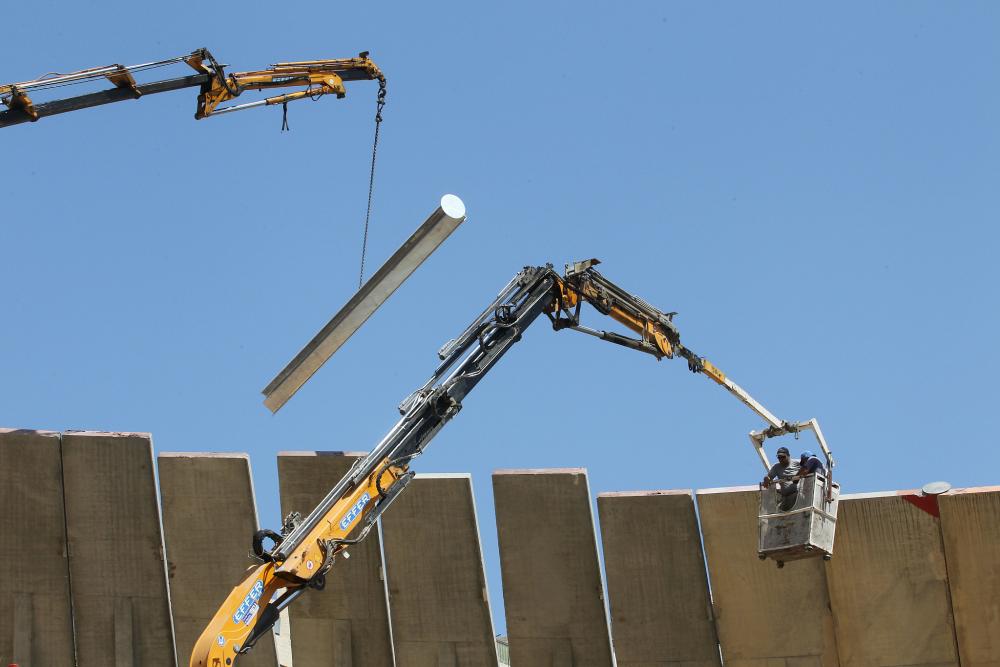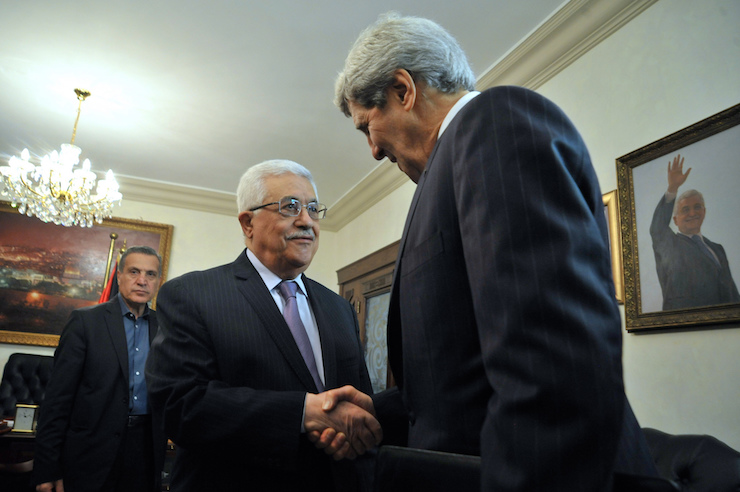We Are All One Staters Now

In the final days before the second Israeli elections of 2019, Prime Minister Benjamin Netanyahu announced a special press conference. Speculation ran high: was the prime minister about to resign and fight the criminal charges against him in court? Would he announce the much-hyped mutual defense pact with the United States? Bibi’s aides signaled he had something even bigger in store.
The reveal came on Sept. 10: that evening, Netanyahu vowed to annex the Jordan Valley, deep inside the occupied territories, to Israel. He delivered his speech alongside a large map of the eastern West Bank, which he occasionally gestured at with a pointer.
“The Valley,” as it’s referred to in Israel, is the least populated region in the West Bank. It consists of one Palestinian city, Jericho, and numerous smaller communities. It is also home to several small, non-ideological, settlements. But according to most maps, the Jordan Valley makes up between a quarter and a third of the West Bank. In the past, therefore, an announcement on future annexation would have caused a political storm in Israel, since it would have spelled the death of the two-state solution, the end of the “temporary” occupation, and the beginning of a new era in the conflict. For many, it would have meant the end of Israeli democracy.
Not today, though. Netanyahu’s words were met with a collective yawn. The same thing happened several months later, when the prime minister tried to challenge his main adversaries, Benny Gantz’s Blue and White Party, to join him in supporting annexation. Nobody cared.

Hadas Parush/Flash90 // +972 Magazine
Part of the reason for the muted response is that such declarations, made on the evening of the final polls, are always taken with a grain of salt. But something else is at play here: for some time now, Israel has been treating the West Bank as its own (and especially the 60 percent of the occupied territory over which the Palestinian Authority has no power). Annexing it would be just adding legal formality to a situation that everyone has been used to for a long time.
In practice, Israel has already annexed the West Bank. It has a monopoly over the use of violence in the territory, over its airspace, over who goes in and comes out, over its currency and over the population registry. Israel extracts natural resources and dumps its garbage there. It builds settlements for Jews and rejects any legal authority but its own.
These elements were cemented in the previous decade. Attempts to challenge them — through the diplomatic process or popular protests — failed. Israel has been successful in containing violence as well. The old axiom that “the status quo is unsustainable” has been proven wrong.
Another axiom said that Israel cannot be an occupier and a democratic state at the same time; that it would need to give up one of the two: democracy or territory. This was also proven wrong. The world recognizes Israel as a democracy and as a legitimate member of the western world (where some criticism of Israel and Zionism is even being outlawed). Israelis themselves believe they live in a democracy, and when they don’t, the reason has to do with corruption, the lack of good governance, the power of the judiciary, or Netanyahu’s legal cases. Hardly anyone chalks it up to the fact that 40 percent of the population under Israeli rule is deprived of basic civil rights or political representation.
To the outsider, it seems that the past decade has changed very little about the conflict. But the truth is that something very substantial did, indeed, occur. This was the decade of the one-state solution. The ideological argument between one staters and two staters, which continues to this day, disguises the fact that in practice we are all one staters. Other ideas are completely hypothetical.

Nasser Ishtayeh/Flash90 // +972 Magazine
Israeli democracy consists of a permanent structure made up of two governing systems — one for the Israeli citizens (including Palestinian citizens of Israel), and another, authoritarian system for Palestinian non-citizens. People argue whether this is the result of advanced planning or the outcome of a historical coincidence. Regardless of the answer, there is no doubting both the existence and the surprising resilience of this model.
The occupation has been going on for nearly 53 years. The Palestinian Authority was born 25 years ago. The median age in Israel is a little under 30; in Gaza it is under 20. In other words, this is the only reality most Israelis and Palestinians know: The one-state reality.
***
I believe that the secret to Netanyahu’s long term as prime minister — the longest in Israeli history — has been his ability to promote the status quo as the preferred solution to the conflict. As I’ve argued previously, the status quo is the least worst option as far as Israelis are concerned, since it doesn’t require them to go through the painful process of making territorial concessions or incurring far more dramatic changes that a single democratic state would bring. Israel could remain relatively secure and prosperous while maintaining most of the Palestinian population under a military dictatorship.(*)

Nati Shohat/Flash90 // +972 Magazine
Netanyahu, and later others on the Israeli right, understood that when the world condemned the occupation, it was threatening them with an empty gun. Nobody in the U.S. or the European Union, let alone in other countries, was interested in investing the kind of resources necessary to push Israel out of the West Bank and establish an independent Palestinian state.
Following the Arab Spring, when regional stability and security became everybody’s main concern, whatever motivation was left for dramatic changes evaporated, and the world was more than happy to assist in maintaining the status quo. It did so by financing the PA; training its security forces; allowing and even maintaining the blockade on Gaza and the military operations that went hand-in-hand with the siege;(**) and by moving diplomacy out of international institutions such as the UN into the realm of U.S. administrations. Those who are angry at the way President Trump has recognized Israeli annexation can only blame themselves for letting America monopolize the conflict in the first place.
***
Looking back, I am amazed at how slow many progressives — myself included — were to recognize these trends. Because the occupation was such an aberration in the international system of sovereignty and citizenship (even authoritarian governments don’t maintain close to half their native population as “non-citizens” subject to martial law), I was certain that Israel would either end the occupation on its own or be isolated and forced to end it. Even before the Arab Spring, I underestimated the forces maintaining the status quo. I took declarations by foreign officials at face value rather than for what they were: lip service to dead ideas. I also believed that nonviolent protests in the West Bank would be the seeds of a major political force for change, and failed to grasp the effectiveness of the Israeli army and the PA in suppressing them and in maintaining the status quo.
The Palestinian Authority was always a a strange hybrid: a state in waiting with an element of the current political order. In the last decade, we witnessed the first part collapse; today only the second remains. The Palestinian national movement split into several pieces, each with its own political agenda: residents of Gaza, East Jerusalem Palestinians, prisoners, refugees, Arab citizens of Israel. Each one of these groups carried out collective struggles, but none carried the others with it. The only group to successfully advance its cause was Palestinian citizens of Israel. It’s clear why: despite facing discrimination, they are still included within the framework of Israel’s democratic institutions, and have learned how to take advantage of the limited tools afforded to them. Their success has demonstrated that there is no substitute for civil rights; those who lack them simply stay behind.

Wisam Hashlamoun/Flash90 // +972 Magazine
To be fair, we cannot separate the crisis of progressive politics in Israel-Palestine from the global crisis of progressive and left-wing politics. Culturally, progressive politics are doing well. But within formal political structures — where elections are held and governments are formed — progressivism is on the ropes. The Israeli-Palestinian conflict, of course, was never a purely cultural issue. Whether it is the one- or two-state solution, a confederation, or anything else, they all require strong, unified political movements in which people are ready to cooperate with those who hold different values. They must be willing to compromise on core issues, be loyal to one another, follow the political leadership, and remain rooted in the reality on the ground, rather than in symbolism. In an age of self-centered, abstract liberal politics, we are as far away from that as possible.
***
So what comes next? After these failed predictions, it would be pointless to add another one. In fact, I think that any feeling of “inevitability” in politics has always been part of the problem. Progressives got increasingly better at working on process, many times at the expense of investing in hard political currencies. Everybody waited for “forces on the ground” (or for “outside forces”) to bring about change — but no such forces appeared, and when things did change, those who benefited from the status quo were quicker to adapt and capitalize on them.
Nonetheless, the vanishing of the two-state solution over the past decade may not be a net negative. I am not certain that the two-state model proposed in recent years — especially during the negotiations led by Secretary of State John Kerry — would have led to more freedom, happiness, security (for both people) and prosperity. A tiny Palestinian state with a large internal security apparatus, supported by U.S. and European money, would have looked much like a version of the “moderate” Arab states — an authoritarian regime that relies on the persecution of its own people in order to remain intact.

State Dept photo
The advantage of the two-state solution was that it was a simple idea for people to envision — especially Israelis and Americans. This last decade, two states went from being a political program to a fata morgana: the closer you get to it, the further away it moves. The one-state condition, on the other hand, is the desert where we now find ourselves.
Any political plan should start with recognizing this reality, not with the abstractions and fantasies with which we dealt in recent years. We might not have a clear vision of the future, but we can unite around what is terribly wrong in the present. Fighting to end the siege on Gaza — the most inhuman aspect of the status quo — would be a good start.
(*) Some argue that the Palestinian Authority is to blame for the non-democratic system the Palestinians are under, since President Abbas forbids holding new elections. But even if the Palestinians did vote for their representatives every few years, they would not be able to take part in making major decisions that shape their lives, since the power of the sovereign remains exclusively with Israel. For example, the Palestinian Legislative Council could decide to build a new city or to invite Palestinian refugees from Syria to settle in the West Bank, yet these decisions would be meaningless without Israeli consent. The PA can issue travel documents to its own people, but without Israeli consent they won’t be able to travel out of the country, etc.
(**) The international community accepted the siege as legal. By closing the Egyptian border or blocking flotillas from departing from Europe to Gaza (in the case of Cyprus and Greece), some countries have actively aided and abetted the siege. As for the military operations, when Israel ran out of munitions in 2014, the Obama administration opened its own emergency storage and provided the IDF with artillery shells and bullets.
[Noam Sheizaf is an independent journalist and editor. He was the founding executive director and editor-in-chief of +972 Magazine. Prior to joining +972, he worked for Tel Aviv’s Ha-ir local paper, Ynet, and the Maariv daily, where his last position was deputy editor of the weekend magazine. He is currently working on a number of documentary films.]
+972 Magazine is nonprofit journalism based on the ground in Israel-Palestine. In order to safeguard our independent voice, we are proud to count you, our readers, as our most important supporters.
